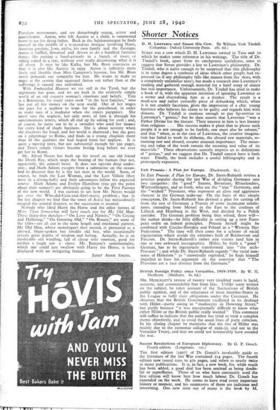Shorter Notices
D. H. Lawrence and Susan His Cow. By William York Tindall. (Columbia : Oxford University Press. 18s. 6d.)
SUSAN was a cow which D. H. Lawrence owned in Taos and to which he makes some reference in his writings. The title of Dr. Tindall's book, apart from its catchpenny usefulness, aims to suggest that Susan provides a key to Lawrence's philosophy. Dr. Tindall, who is naïve enough to be surprised that this philosophy is in some degree a synthesis of ideas which other people had ex- pressed (as if any philosophy falls like manna from the skies, with a completely unfamiliar taste), has made a research into Lawrence's reading and gathered enough material for a brief essay of minor but real importance. Unfortunately, Dr. Tindall has tried to make a book of it, with the apparent intention of ignoring Lawrence as a writer and discrediting him as a thinker. The result is a medi3cre and rather cowardly piece of debunking which, when it is not crudely facetious, gives the impression of a chic young barrister who believes his client to be guilty and regards him with distaste. Dr. Tindall is cautious enough to pay lip-service to Lawrence's " genius," but he then asserts that Lawrence " was a Father Divine for the literate. Their interest in him is less literary than religious. . .. His success makes it plain that to please such people it is not enough to be foolish; one must also be solemn," and that " when, as in the case of Lawrence, the creative imagina- tion has failed to work its alchemy, the absurd raw materials, re- maining raw and absurd, assume unusual importance. The mean- ing and value of the work remain the meaning and value of its materials." These observations scarcely impress us as definitions of " genius," and we suggest that Dr. Tindall cannot have it both ways. Finally, the book includes a useful bibliography and is grotesquely expensive.


























 Previous page
Previous page